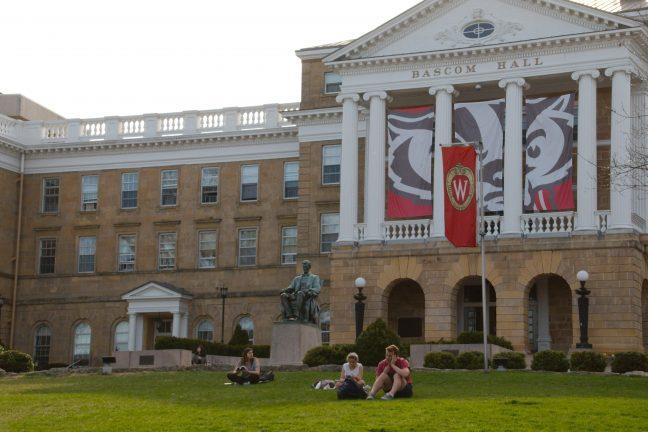The University of Wisconsin System has requested $25 million of their biennial budget to increase student capacity for high-demand fields such as healthcare, computer science and engineering across all UW System schools.
The request was originally made at a Board of Regents meeting in August. Feb. 8, five Chancellors, including UW-Madison Chancellor Rebecca Blank, met to hear more details about proposed plans for their institutions.
The plans vary across the UW Systems Schools, and emerged to address both student success outcomes and workforce needs, according to the Biennial Budget Request.
UW System President Ray Cross said the System is working hard to meet address student needs.
“UW System institutions are engaging in innovative and impactful work to meet the needs and address the challenges facing Wisconsin,” Cross said in a statement from the Board of Regents.
At UW-Madison, these efforts are focused on expanding and enhancing four departments: engineering, nursing, computer sciences and business.
The College of Engineering would add an additional 800 spots, ease course bottlenecks — the seat capacity for each course, develop new courses, attract/retain more underrepresented students and graduate 650 more engineers over the next five years.
Ian Robertson, Dean of the College of Engineering, said the demand from students is actually much higher than the school can currently accommodate for.
“There’s a good opportunity for us to grow because we know the student demand is there in those areas, we just have to increase instructional capacity,” Robertson said.
UW to receive smallest amount of funding from UW System budget
Increasing capacity includes hiring additional staff, such as tenure track faculty, technicians and academic advisors, Robertson said. It will also require modernizing existing instructional spaces to allow space for a growing student population, particularly in the most high demand fields of biomedical, mechanical, computer, chemical and biological engineering.
The School of Nursing is another target for the capacity building initiative.
It would expand the undergraduate enrollment by 25 percent and focus on updating their educational technology. Like the College of Engineering, high student enrollment has lead to these initiatives, Linda Scott, dean of the School of Nursing said.
“UW-Madison students want to be nurses,” Scott said. “The work is rewarding and versatile, salaries are strong, and vast growth opportunities exist within the profession. And yet every year we must deny admission to more than 60 percent of qualified applicants. I would prefer to educate more of these qualified, talented, ambitious students here at the UW-Madison School of Nursing.”
Increased enrollment is critical during Wisconsin’s current nursing crisis. Wisconsin’s elderly population is growing exponentially, and simultaneously experienced nurses are retiring from the profession, Scott said.
This gap between the supply and demand of registered nurses is projected to reach 27,700 by 2040, according to the Wisconsin Center for Nurses.
In the Computer Sciences Department, expansions include the creation of a new undergraduate degree, an additional 2,000 seats added to high-demand classes and graduation of an additional 800 to 1,000 more students over the next five years.
The new major in data computing will be a combination of multiple disciplines, with requirements in mathematics, statistics and computer science. Remzi Arpaci-Dusseau, professor and associate chair of the Computer Science Department, said this is emblematic of the type of collaboration that is needed for the future of computer science, as computer and data science are transforming many industries and disciplines.
“I’ve been here a professor for almost 20 years, and this absolutely the most exciting time for computing and related areas that I’ve seen,” Arpaci-Dusseau said. “There’s just so much excitement around the space, and to see the campus behind it, is really tremendous.”
UW-Madison also plans to expand the School of Business. Plans include adding 300 additional spots, offering high-demand courses online and expanding courses in growing areas. In addition, the School of Business will add three new masters programs.
Survey ranks UW sixth in research expenditures, retains 2016 rank
Despite this growth, many of these high-demand fields face racial and gender disparities, both on campus and in the broader industries. In Spring 2018, less than one-third of undergraduate students pursuing an engineering degree identified as female, according to the Office of the Registrar.
This is an improvement from the past four years, Robertson said. The school is also working on increasing the number of women faculty, which has increased from 12 percent to 20 percent in the past four years.
The Computer Science department faces similar statistics: In Spring 2018, UW-Madison recorded 1,296 male undergraduate students pursuing a computer science degree, compared to 280 female undergraduates, according to university data.
In the same semester, an overwhelming percentage of students pursuing the major were Caucasian: 813, compared to 18 African American students, 38 Hispanic students, 198 Asian students and eight Native American students.
Arpaci-Dusseau found that many of these disparities exist before students come to UW-Madison, and one way Arpaci-Dusseau’s department has addressed this is by creating partnerships with K-12 schools.
“Often by the time people got to campus, even from the day they arrived, they had already decided they don’t want to be a computer scientist,” Arpaci-Dusseau said. “If you introduce it to people to it early, the idea is that they will see it is more than just sitting in front of a screen, they can understand there is all these beautiful ideas inside of computer science.”
The approval date for these measures has yet to be determined.



















